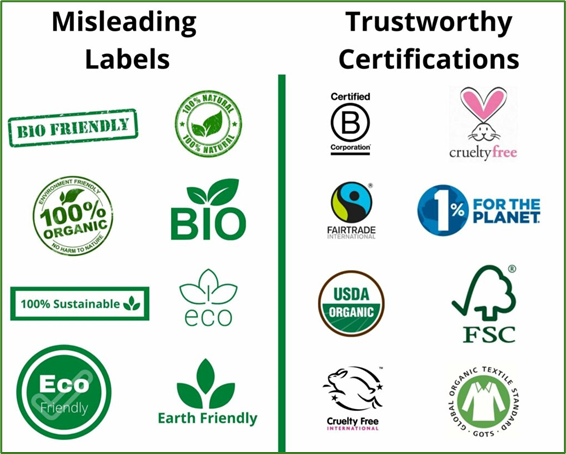Introduction
In today’s world, the spotlight on Environmental, Social, and Governance (ESG) practices is brighter than ever. Stakeholders, including investors, consumers, and even corporate employees, are demanding that companies show their commitment to sustainability. However, this increased scrutiny has also exposed the danger of being labeled as having engaged in greenwashing. This is where businesses overstate their environmental credentials whether intentionally or unintentionally in a way that may mislead consumers and investors.
Understanding Greenwashing
Greenwashing is a deceptive practice where exaggerated or false claims are made, either intentionally or unintentionally, about the environmental friendliness or sustainability of a product, service, or company. In essence, it is a kind of false advertising related to sustainability. It can take many forms, from the use of vague terms like “all natural” without providing specifics, to misleading visuals, overstating mitigation strategies or goals, or irrelevant environmental claims.
In the past, greenwashing focused solely on misleading environmental claims. As more countries enact or propose new anti-greenwashing regulations, these regulations now encompass social and ethical practices too. This means greenwashing can now involve deceptive claims that go beyond just the environment and include social and governance programs as well.
In this article, we examine the most common characteristics of greenwashing, identify some of the recent legislation in different jurisdictions addressing this issue, and the impact of greenwashing on companies’ reputations and bottom lines in light of greater regulatory scrutiny that is developing around the world.
Types of Greenwashing
- Making False Claims: This is the most straightforward case of greenwashing, where organizations are found to have made baseless claims about their product or service without thorough research or tangible data. A recent case involved the European Commission and the CPC Network (Network of Consumer Protection Cooperation) sending letters to 20 airline companies in which several types of misleading green claims were identified. The letters also invited the airlines to bring their practices in line with the EU consumer law within 30 days. Some examples of the misleading practices identified were the use of terms like “Sustainable Aviation Fuels” (SAF) without a proper basis, and using terms like “green,” “sustainable,” or “responsible” in an absolute way or using other implicit green claims.
- Selective Disclosure: Selective greenwashing occurs when a product is labelled as “green” based on a limited set of attributes that are determined to have failed to consider other critical environmental factors. A notable example involves an automotive manufacturer that promoted its “Eco-Friendly” diesel engine technology as a clean and efficient driving solution. However, investigations revealed that the company had secretly installed software in 11 million vehicles, allowing them to cheat emissions tests. These cars emitted pollutants far beyond acceptable limits. As a result, the company had to pay fines of nearly $18 billion. This case highlights the importance of transparency and accountability in environmental claims.
- Exaggerating Environmental Benefits and Lack of proof: This deceptive practice involves overstating how eco-friendly an organization claims it is in various reports published to stakeholders or filed with various regulatory agencies. The risk of a company being found to have engaged in this type of greenwashing inadvertently is particularly high given competing ESG reporting requirements across different jurisdictions or even different agencies within the same country. Without fully understanding differing requirements, a statement that would be adequate or accurate in one country or reported to one regulatory body may not be adequate when reported similarly to another.
- Relying on Vagueness: This type of greenwashing occurs when a claim is made that is ambiguous or broad and may lead to consumers misconstruing its true significance. For example, terms like “100% natural,” “biodegradable,” and “eco-friendly” have sometimes been found on products determined to contain synthetic ingredients. This practice can lead to the imposition of large fines by regulators.
- Misleading Visuals or Graphics: Companies may be determined to have used misleading imagery in various reporting, such as that of pristine scenes in an attempt to show preservation of nature and eco-friendliness, according to the Natural Resources Defense Council, a non-profit environmental advocacy group. However, based on the particular circumstances, this can be found to potentially deceive consumers about the environmental impact of their products.
- Fake Certification: Companies can also be found to have engaged in greenwashing if they claim unrecognized third-party certifications. For example, labelling products as “green” without genuine certification can be determined to be misleading to consumers.

Anti Greenwashing Regulations Around the World
Businesses should be aware that environmental marketing practices and sustainability reporting to shareholders and regulatory bodies are under heightened international observation. Accusations of greenwashing are on the rise. Companies may face criticism for misleading claims in their marketing and public statements, covering a spectrum of issues from recycling practices to the use of polluting substances, climate change initiatives, and beyond if they are not careful in how they craft statements about environmental goals and progress towards meeting those goals. Worldwide, there is a growing movement to address greenwashing. Below are some examples:
- European Union: The European Union has taken a significant step towards promoting increased environmental transparency by enacting the Directive on Empowering Consumers for the Green Transition. This directive, which became effective March 26, 2024, is designed to eliminate deceptive environmental claims. The EU rules prohibit “generic environmental claims on products without proof,” bans “claims that a product has a neutral, reduced or positive impact on the environment because the producer is offsetting emissions,” and bars “sustainability labels that are based on approved certification schemes or established by public authorities.”
The EU also has bolstered its Corporate Sustainability Reporting Directive (CSRD) to apply to a bigger set of large companies as well as small and medium sized companies that are publicly listed. Some non-EU based companies will also be required to report if they generate more than 150 million euros in the EU Market. In addition, the EU Sustainable Disclosure Regulation (SFDR) is designed to help investors make informed choices when it comes to companies and projects supporting sustainability objectives. It also is intended to help investors “assess how sustainability risks are integrated in the investment decision process.”
- Australia: In December 2023, the Australian Competition & Consumer Commission released a set of guidelines to assist businesses in making genuine environmental claims. These guidelines are founded on eight key principles: 1) make accurate and truthful claims; 2) have evidence to back up your claim; 3) do not hide or omit important information; 4) explain any conditions or qualifications on your claims; 5) avoid broad and unqualified claims; 6) use clear and easy-to-understand language; 7) visual elements should not give the wrong impression; and 8) be direct and open about your sustainability transition.
- United Kingdom: In June 2023, the UK Financial Conduct Authority (FCA) issued revised guidelines in the UK’s Sustainability Disclosure Requirements (SDR). The guidelines focus on environmental advertising, emphasizing the importance of truthful marketing regarding a product’s ecological advantages. Advertisers are mandated to substantiate their environmental claims, with a heightened level of scrutiny applied to comparative assertions like “greener” or “more eco-friendly.” Furthermore, broad statements such as “beneficial for the planet” or “zero emissions” must be adequately qualified and supported by evidence that confirms the claim for the full lifecycle of the product or service. This ensures that consumers are not misled, and social responsibility is upheld in marketing practices. The issued guidelines by the FCA went into effect on May 31, 2024.
- India: On February 20, 2024, the Central Consumer Protection Authority of India unveiled proposed anti-greenwashing guidelines to curb misleading environmental claims. These guidelines mandate that service providers, product sellers, and advertisers substantiate their environmental assertions—such as “clean,” “green,” “eco-friendly,” and “carbon-neutral”—with credible evidence and proper qualifiers to ensure accuracy and truthfulness. Comparative claims must be supported by transparent, verifiable data, while specific claims like “Carbon Neutral” or “100% Natural” require credible certifications or scientific proof. To maintain transparency, all supporting evidence for environmental claims must be accessible via QR Codes, URLs, or similar digital means in the associated advertisements or communications.
- United States: The Federal Trade Commission is revising its “Guides to the Use of Environmental Marketing Claims,” or “Green Guides,” which advise on environmental marketing and how to substantiate claims to avoid consumer deception. The update, the first since 2012, seeks inputs on terms like “carbon offsets” and “compostable.” Separately, the 50 US states and District of Columbia have their own laws prohibiting deceptive practices with some states specifically enacting anti-greenwashing laws. In addition, several consumer class actions have been brought in state courts. On March, 2024, the US Securities and Exchange Commission adopted rules to require the disclosure of certain climate-related information by public companies and in public offerings. But it doesn’t address greenwashing.
Impact of Greenwashing
Companies must take great precaution to avoid being identified as having engaged in greenwashing. Some common impacts of greenwashing are as follows:
- Reputational Damage: Greenwashing poses a substantial risk to a company’s reputation. In an era where consumers are increasingly environmentally conscious, being found to have reported misleading information can lead to a loss of trust and erode brand loyalty. This reputational damage can have enduring effects, impacting customer acquisition and retention.
- Legal Consequences: Greenwashing can expose businesses to legal and regulatory risks. Many countries have laws and regulations to prevent deceptive advertising practices, including false or exaggerated environmental claims. Engaging in greenwashing can result in legal action, fines, and damage to the company’s standing in the industry.
- Active Shareholder Takeover: Where a company is perceived as having engaged in greenwashing, it may also find itself subject to active shareholders forcing corporate change — even at the expense of other corporate goals. This can occur either through derivative shareholder litigation (which is becoming increasingly common in both Europe and the United States) or active shareholders demanding that environmental change be made at annual shareholder meetings through forced agenda changes.
- Undermining Genuine Sustainability Efforts: Greenwashing not only harms the perpetrating company but also hinders progress toward global sustainability goals. When businesses make inflated or misleading environmental statements, it diverts attention and resources away from other more authentic sustainability initiatives that the company may also be actively pursuing.
- Financial Burden: Greenwashing can lead to financial repercussions for businesses. The costs of defending against legal action, potential fines, and rebranding or rebuilding trust can be substantial. In contrast, companies that genuinely embrace sustainability can experience cost savings through improved resource efficiency, reduced waste, and increased customer loyalty.
Conclusion
Greenwashing represents a growing area where companies may either intentionally or unintentionally make statements about environmental goals or progress towards those goals which undermines what global regulators, investors, and consumers expect of a socially responsible corporation.
Companies that are found to have engaged in greenwashing risk long-term reputational damage, legal consequences, and the erosion of consumer trust. Conversely, those that carefully craft their environmental reporting and marketing to reflect authentic values and concrete actions towards sustainability will build stronger, more loyal relationships with their customers and stakeholders. Reducing greenwashing is a collective effort that requires vigilance, education, and a commitment to socially responsible corporate practices.
Acknowledgments
We would like to thank our colleagues Trushi Shah, Tanish Parnami and Kim Logue for their insights and expertise that greatly assisted this research.
Trushi Shah is an Associate at J.S. Held’s Global Resource Center practice in South Asia. Based in Mumbai, Trushi specializes in taxation and statutory audit. Her primary responsibilities are undertaking financial investigation assignments and monitoring the overall forensics accounting team. She has extensive involvement in subject matters related to accounting fraud, cost analytics, and document review.
Trushi can be reached at trushi.shah@jsheld.com or +91 996-787-3698.
Tanish Parnami is an Associate in J.S. Held’s Global Investigations practice and is based in Mumbai, India. Tanish works on projects in the areas of multi-jurisdiction investigation, e-discovery, data analytics, investigative due diligence, white-collar crimes, fund disbursement process review, and senior management due diligence. He has worked on multiple investigations involving financial and accounting fraud, corruption and bribery allegations, and other malfeasance across jurisdictions, including the Middle East, Asia, and the United States.
Tanish can be reached at tanish.parnami@jsheld.com or +91 757-506-6829.
Kim Logue is an Associate Vice President in J.S. Held’s Environmental, Health & Safety – Risk & Compliance group. She specializes in environmental risk and compliance. With over 15 years of experience in the areas of environmental and natural resources law, Ms. Logue provides consulting and expert services for industrial facilities and law firms throughout the United States. She has extensive experience with assessing and managing potential and ongoing compliance obligations with innovative client-focused strategies. She conducts environmental compliance audits, advises clients on the development of effective environmental management systems, and conducts due diligence associated with mergers and acquisitions. She routinely supports clients on rulemaking and legislative efforts focused on environmental and natural resources issues.
Kim can be reached at kim.logue@jsheld.com or +1 504 561 6563.
Find your expert. ℠
This publication is for educational and general information purposes only. It may contain errors and is provided as is. It is not intended as specific advice, legal, or otherwise. Opinions and views are not necessarily those of J.S. Held or its affiliates and it should not be presumed that J.S. Held subscribes to any particular method, interpretation, or analysis merely because it appears in this publication. We disclaim any representation and/or warranty regarding the accuracy, timeliness, quality, or applicability of any of the contents. You should not act, or fail to act, in reliance on this publication and we disclaim all liability in respect to such actions or failure to act. We assume no responsibility for information contained in this publication and disclaim all liability and damages in respect to such information. This publication is not a substitute for competent legal advice. The content herein may be updated or otherwise modified without notice.




Leave a Reply